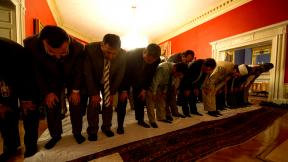
Forgiveness is often a one-time, one-issue experience for most of us. Someone harms us, they may or may not ask us for forgiveness, and we offer it.
Many of us do it for the sake of Allah, remembering that, as Prophet Muhammad, peace and blessings be upon him, once said, “All of the children of Adam are sinners, and the best of sinners are those who repent” (Ibn Majah). Or we may do it because forgiveness benefits us psychologically and physically.
Regardless of the reasons, for many of us, forgiveness is not a habit we engage in in a systematic, regular manner. But this is key to gaining its spiritual, psychological, and health benefits.
One of the best examples can be found in the following incident found in Kitab al-Zuhd by Ibn al-Mubarak, Number 694:
The Messenger of Allah, peace and blessings be upon him, was sitting with a group of the Companions in the Masjid and he said, "A man will now enter (who is) from the people of Paradise." The man walked in. Later it happened again, and then a third time.
Abdullah ibn Amr ibn al-Aas wanted to find out what was so special about this individual, so he asked the man if he could stay over at his house for three days, making an excuse to stay. The man allowed him to do so.
Observing him carefully in his home, Abdullah noticed that the man didn't do anything out of the ordinary. He didn't fast all the time, he slept some of the night and prayed some of the night, and so on. So after the three days, Abdullah told him the real reason why he requested to stay with him, and he asked him what it was that could be the reason why he was from the people of Jannah.
His host couldn't think of anything, but after some time, he said, "Every night, before I go to sleep, I forgive whoever has wronged me. I remove any bad feelings towards anyone from my heart."
Forgiveness was as natural to this man as brushing our teeth before bed is for the rest of us. It was something he had developed the habit of “just doing”. It became part of his life in an integral way, the way prayer, fasting, paying Zakah and other acts of worship are for a Muslim. And how many of us offer these Ibadat while holding grudges, bitterness, and resentment toward family members, friends, or strangers.
Similarly, the following Hadith gives us an even stronger incentive to forgive regularly.
Prophet Muhammad, peace and blessings be upon him, said, “The deeds of people would be presented every week on two days, Monday and Thursday, and every believing servant would be granted pardon except the one in whose (heart) there is rancour against his brother and it would be said: Leave them and put them off until they are turned to reconciliation” (Muslim).
In other words, there are serious spiritual consequences to maintaining a grudge and withholding forgiveness. Our good deeds, which we are currently trying to increase in the blessed month of Ramadan, are in a way “blocked” when we don’t forgive. A twice-a-week purge of bitterness may be just the thing we need to push us to let go of anger and resentment.
In Ramadan specially, as we try to cultivate all kinds of good habits, let us also develop the habit of forgiving regularly. Whether it is right before bed, or on Monday and Thursday mornings, let us embrace this powerful spiritual tool that will bring us closer to our Creator.






Add new comment